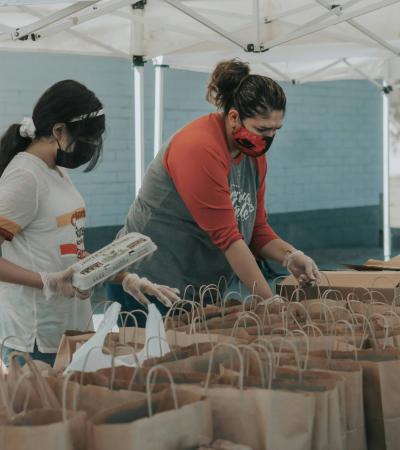The Let’s Talk About program is a new series designed to engage the community in deeper discussions about noteworthy subjects that are often difficult to talk about. The library announces the subject, provides book lists to encourage a deeper dive into that theme, offers a safe place for the discussion, and coordinates the experts and authors who inspire and lead the program for more open conversations.
Previous Let's Talk About conversations centered around death, racism and voting, and our library plans to host more programs in 2017.
The program’s success relies on audience participation, which has proven to be thoughtful, engaging, and at times, very enthusiastic and robust. It is a 90-minute facilitated program.
Advanced Planning
Our “Big Ideas” team met in summer 2014 and started talking about what the community was looking for. The Let’s Talk About series started forming out of those initial discussions with an eye on community need, decreasing expenses and better utilizing staff time across the system. The essentials for pre-planning this program are:
1. Choose a book and schedule the author
2. Select a co-speaker/facilitator
3. Book the event/meeting room
4. Meet with the library marketing team to plan a program launch
5. Let the staff know about the program and the reasoning behind it
6. Invite the local bookseller to be at the event
Our first challenge occurred at the first program. The author had a medical emergency three days before the event and couldn’t participate. We were able to secure a local expert that led that conversation admirably. Lesson learned: having an author is great, but not absolutely necessary.
The second lesson learned was that a smaller room is better than a larger room; it promotes more open discussions among the participants as opposed to an auditorium-type venue that can feel impersonal. Our meeting room holds a maximum of 120 people, which proved to be the perfect size.
Marketing
We needed to develop a strong marketing and communications plan to support the evolution of this new cornerstone program. To start, we created an individual brand concept that provided the understanding that the event was an ongoing community discussion.
Because we were providing various action and reading lists to support each discussion, we purchased a specific URL (http://www.saclibrary.org/LetsTalk) for the event that points back to the program information on our website. (View a resource list for our Let's Talk About Race program under Attachments at right.) This was done to provide an easy access point for the public.
Each event was prominently featured on our website, event-specific emails were sent to our full patron list, and lobby signs were set up at the Central Library in the weeks prior to the event. (View signs for our Let's Talk About Death and Let's Talk About Race programs under Attachments at right.)
Once the collateral was up, we worked to place both the library director and the subject matter experts or authors with major media outlets (public radio and the regional newspaper; local TV, news radio and community newspapers) to help spread the word via interviews and articles.
We then pushed media coverage out via social media, along with other engaging conversation starters. We’re still determining which content is of the most interest to our social audiences, but believe we’ll find the niche there as the program continues to grow and gain attention.
Budgeting
We started the process knowing that we wanted to spend less than we had spent on One Book Sacramento events in previous years. This was easily accomplished by providing a list of books to explore on a theme rather than supplying hundreds of people in the community with copies of the same book that we didn’t later need for our collection.
The first year (2016) was a soft launch of the program. In 2017, we look forward to working with the SPL branches to develop programming leading up to the keystone Let’s Talk About event. Plans include development of book clubs, smaller group discussions and more.
The 2016 program budget involved:
1. Author fees: $1,500 to $3,000 when required
2. Facilitator fees: $100 to $500 (both fees were negotiable based on travel needs)
3. Light refreshments and some fresh flowers for the food and drink table: $80
4. Outside contractor for stage and audio: $600
Any substantial cost-cutting would be in your speaker/author selection. Because our first author was unavailable we did not have to spend that money, but the author for our second installment was very popular and worth every penny.
Day-of-event Activity
The set-up for the day of the event is minimal. The contractor takes care of the stage and sound for the speakers. The room is set up theater-style for 120 people, and we provide the food trays, water, coffee and tea.
Most of staff time is spent setting up refreshments, taking care of the speakers, checking people in and welcoming the guests. Staff facilitate questions from the audience and pass out surveys at the end to capture participants’ feedback. We allot a four-hour shift for three people the day of the 90-minute program.
Program Execution
So far, we’ve held the following programs:
- Feb. 28, 2016: Let’s Talk About: Racism (Discussing “Waking up White” by Debby Irving, facilitated by Ginger Rutland and Dia Penning)
- May 15, 2016: Let’s Talk About: Death (Featuring “Smoke Gets in Your Eyes” by Caitlyn Doughty - View a video of this Let's Talk About program under Videos and Images at left.)
- Sept. 28, 2016: Let’s Talk About: Voting (Hosted by Kim Nalder, Project for an Informed Electorate)
More than 100 people have attended each program. We realized during the first event that we not only needed a facilitator to guide the conversation, but we also needed a fearless personality to manage the questions on the floor. The audience was eager to participate, but we found it inefficient to use a system where attendees wrote down questions we later collected. Participants were respectful of others' time, but it was noted in the feedback that some felt they hadn’t had an opportunity to ask their question(s).
We knew the program had met and exceeded our expectations when several conversations continued in the lobby and outside of the library after the program had ended. The feedback, both verbally and from surveys, had one resonating question: When is the library hosting the next conversation on the same topic? We collected more than 60 surveys for each program, and the majority came back with very positive reviews and appreciation for having this type of programming available at the library.
Additional successes from the program include renewed or new partnerships with regional experts that have often allowed us to be more available to the public.
To help evaluate the impact of this program, we handed out the PLA Project Outcome Education and Lifelong Learning Survey. As mentioned above, the overriding theme of the survey outcome was that “the conversation was only getting started.” Others enjoyed that humor was incorporated into these heady topics, making the atmosphere friendlier and more comfortable for sharing ideas and experiences.
We will continue and/or incorporate several of the offered suggestions into our 2017 series. So far our planned programs for 2017 are:
- March 19, 2017: Let’s Talk About: Immigration (Discussing “Funny in Farsi” by Firoozeh Dumas)
- June 11, 2017: Let’s Talk About: Gender (TBA)
- Oct. 15, 2017: Let’s Talk About: Suicide (TBA)
Advice
Go for it! It’s a fairly simple program to coordinate and the discussion possibilities are endless. The key is finding good speakers and having an effective marketing campaign in place for both internal and external promotion.
This program series has involved people that normally don’t take part in discussions or “traditional” library programming. We took a bit of a risk, but now know that it was well worth it. The community is gearing up for our next round of discussions — and we’ll be ready for them.
Supporting Materials
- Feedback (Coming Soon!)
- Programming Librarian Facebook Group


